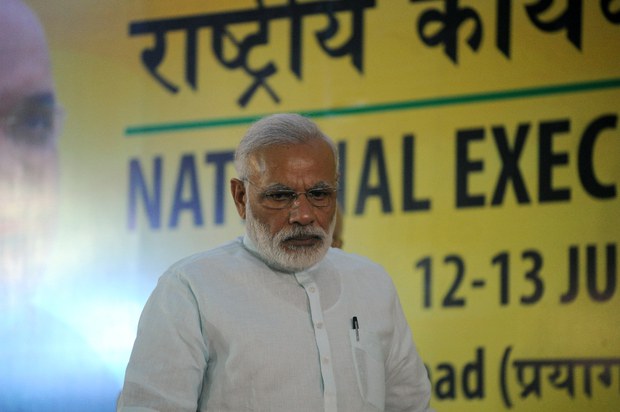India: Bengali Muslims Cry Foul Over Detection of Illegal Immigrants
2016.07.04
Guwahati, India
 Immigrants living in Assam state, who came from East Pakistan (now Bangladesh) before 1971, would have to reapply for citizenship with supporting documents, said the BJP, the party of Indian Prime Minister Narendra Modi, picture at the party’s national executive meeting in Allahabad, June 12, 2016.
Immigrants living in Assam state, who came from East Pakistan (now Bangladesh) before 1971, would have to reapply for citizenship with supporting documents, said the BJP, the party of Indian Prime Minister Narendra Modi, picture at the party’s national executive meeting in Allahabad, June 12, 2016.
Bengali Muslim Faizur Rehman sobbed helplessly while pleading for leniency when a court last month dismissed his claim of being Indian and ordered his detention.
He was born in India in 1949 but his name did not figure in its National Register for Citizens (NRC) because of a minor glitch, claims Rehman, a resident of Barpeta district in the northeastern Indian state of Assam.
“According to the 1951 NRC, my name is mentioned as Faizul Bepari – probably an error on the part of the official who was updating the list then. The court said my name did not match with official records,” Rehman, 67, told BenarNews before he was taken to a detention camp in Assam where suspected illegal immigrants are housed.
The state’s Foreigners Tribunal classified Rehman as a “doubtful voter” – or D voter – because he could not produce documents to validate his citizenship, according a court official.
Rehman is one of nearly 150,000 D-voters in Assam, which shares its border with Bangladesh, who live in fear of being left off of the NRC’s final list after the Hindu nationalist Bharatiya Janata Party (BJP), piggy-backing on the promise to flush out all illegal Bangladeshi immigrants, came to power in state elections in May.
Rehman claimed that his father migrated to India from the former East Pakistan – now Bangladesh – in the 1930s, decades before the birth of Bangladesh in 1971.
“But how do I prove it?” he said. “I am a poor laborer. I barely manage to make ends meet. I was more bothered about how my next meal would come than filing documents. I never thought I would have to prove my citizenship.”
Rehman said he was aware that, like dozens of suspected illegal immigrants languishing in Assam’s six detention camps for failing to prove their citizenship, he, too, would likely never be able to get out.
Dhaka has never accepted India's claim of illegal Bangladeshi influx, making deportation difficult since it does not accept those who illegally crossed over to India as Bangladesh nationals.
“What is happening to me is not right,” Rehman said before being hauled off in a police van.
‘They should have known’
During its polarizing election campaign, the BJP vowed to deport undocumented Bangladeshi immigrants, a large but unknown number of whom has settled in Assam and who arrived in India after 1971.
The party, led by Prime Minister Narendra Modi, said that although it would not deport some 2 million immigrants living in Assam who came to India from former East Pakistan before 1971, they would be barred from voting and would have to reapply for citizenship with supporting documents.
The last time the NRC, a process initiated by the Indian government to detect illegal immigrants, was updated in Assam was in 1951. The controversial procedure has picked up pace since the BJP won power in May, ending a 15-year reign of the All India National Congress, the principal opposition party.
The police are now, for the first time, creating an exclusive database of suspected and declared foreign nationals detained for illegally entering the country, a police source said, adding that this was being done under direction from the state government.
The government, while admitting that a vast majority of the poverty-stricken Assam residents who would not be able to produce valid identification documents would bear the brunt, said the NRC was “the only way to check the illegal influx of Bangladeshis” in the state.
“It’s natural for people who came to Assam decades ago to not bother about keeping documents. But for those who came from Bangladesh before 1971, they should have known that they would be asked to show documents sooner or later,” Prateek Hajela, state coordinator of the NRC, told BenarNews.
All those who have names of their families or parental link in electoral rolls from 1952 to 1971, and can prove it, are considered to be genuine Indian citizens, Hajela said.
Discrimination against Muslims?
However, Muslim rights activists say the government’s process of detecting illegal immigrants is aimed at de-franchising Bengali-speaking Muslims in Assam.
“Through the NRC, the government is trying to create two types of citizens in the state, legal and illegal. The way the entire process has been designed, it appears as a mere tool to take away the political rights of Bengali-speaking Muslims,” said Hafiz Ahmed, who heads a Guwahati-based NGO called Char Chapori Sahitya Parishad, which works to promote Assamese literature in the Muslim-dominated border areas of Assam.
“Most of these people are bona fide Indian citizens, who possibly never kept any documents or lost them due to constant migrations from one place to another for work,” Ahmed told BenarNews.
A senior official in the Bangladesh foreign ministry said it had yet to receive any information from the Indian side regarding the latest attempt to flush out suspected Bangladeshi illegal immigrants.
“The intrusion of so-called Bengalis to India has been a long-standing issue between the two sides. India has been raising the issue at bilateral forums for several years,” the director general-level official told BenarNews while requesting anonymity.
“But we have yet to receive information on any fresh move by the Indian side on this issue following the latest legislative election [in Assam],” he added.
Kamran Reza Chowdhury in Dhaka contributed to this report







